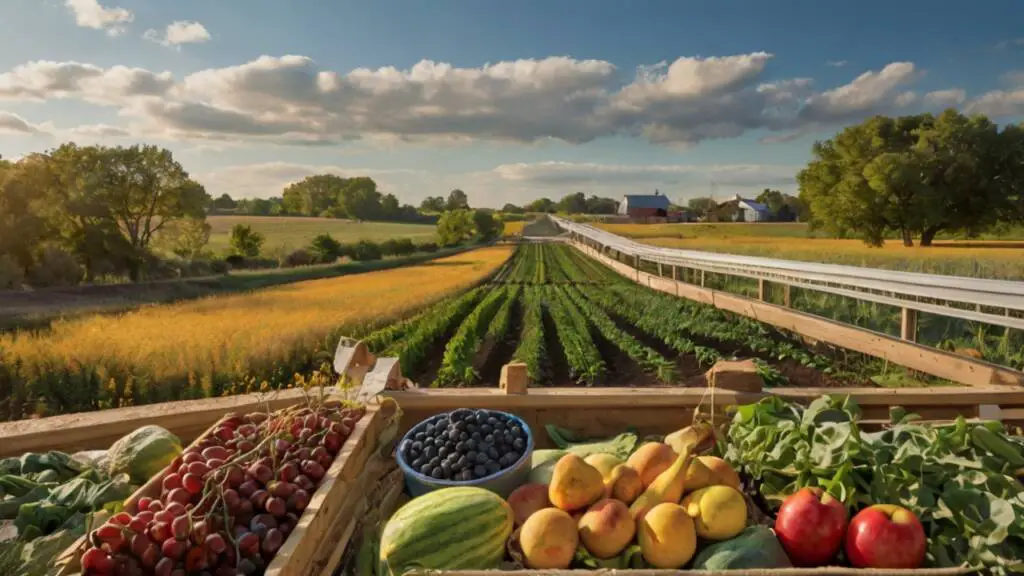Agroecology in the U.S. Food System

Agroecology is a transformative approach to agriculture that focuses on the intersection of ecology, food systems, and sustainability. Unlike conventional agriculture, which often relies on monoculture, chemical inputs, and industrial practices, agroecology seeks to create resilient and sustainable food systems by integrating ecological principles into farming practices. This article explores the fundamentals of Agroecology in the U.S. Food System, its importance for sustainable development, and how it is being practiced in the United States.
What is Agroecology?
Agroecology is both a science and a social movement that applies ecological concepts and principles to the design and management of sustainable food systems. It emphasizes the importance of biodiversity, ecological resilience, and the relationship between agriculture and the natural environment. In essence, agroecology seeks to harmonize farming with nature, promoting practices that support the health of ecosystems, farmers, and communities.
How Does Agroecology Differ from Conventional Agriculture?
Conventional agriculture typically involves large-scale monoculture, heavy use of synthetic fertilizers and pesticides, and a focus on maximizing yield and profit. This approach often leads to environmental degradation, loss of biodiversity, and negative impacts on public health. In contrast, agroecology promotes diversity in cropping systems, reduces dependence on chemical inputs, and prioritizes ecological balance and long-term sustainability. By doing so, it offers a holistic alternative to the industrial agricultural model.
What are the Core Principles of Agroecology?
The core principles of agroecology include:
Diversity: Encouraging a variety of crops and livestock to enhance resilience and reduce risks associated with pests and diseases.
Synergy: Promoting interactions between different components of the farm, such as integrating crops and animals, to create a more efficient and sustainable system.
Efficiency: Reducing the use of non-renewable resources and minimizing waste through practices like crop rotation and composting.
Resilience: Building systems that can withstand environmental stresses and adapt to changing conditions, such as climate change.
Cultural and Social Values: Recognizing the importance of traditional knowledge, local cultures, and community engagement in shaping sustainable food systems.
Why is Agroecology Important for Sustainable Development?
Agroecology is crucial for sustainable development because it addresses the environmental, social, and economic dimensions of sustainability. It contributes to food security by promoting diversified and resilient farming systems that are less vulnerable to climate change and market fluctuations. Furthermore, agroecology supports biodiversity, soil health, and water conservation, all of which are essential for maintaining the long-term productivity of agricultural systems. By prioritizing local knowledge and community participation, agroecology also empowers farmers and strengthens food sovereignty.
How is Agroecology Practiced in the U.S.?
Successful Agroecological Practices
In the U.S., agroecology is practiced through a variety of innovative approaches. These include organic farming, regenerative agriculture, permaculture, and agroforestry. Farmers are increasingly adopting practices such as cover cropping, no-till farming, and integrated pest management to enhance soil health, reduce the need for synthetic inputs, and promote ecological balance.
Leading Regions in Agroecological Initiatives
Certain regions in the U.S. are at the forefront of Agroecological initiatives. States like Vermont, Maine, and California have strong networks of organic and sustainable farms that embody Agroecological principles. In the South, Florida is gaining momentum with initiatives led by institutions like Florida A&M University and the University of South Florida, which focus on research and education in agroecology.
Community Implementation
Local communities across the U.S. are implementing Agroecological practices through community-supported agriculture (CSA), farmers’ markets, and urban farming projects. These initiatives not only provide fresh, locally grown food but also foster connections between consumers and farmers, thereby strengthening the local food system.
What are the Benefits of Agroecology in the U.S. Food System?

Contribution to Food Security
Agroecology enhances food security by promoting diversified and resilient farming systems. These systems are less reliant on external inputs and more capable of withstanding environmental shocks, making them more reliable sources of food.
Promotion of Biodiversity
By fostering diverse cropping systems and reducing the use of chemical pesticides, agroecology promotes biodiversity. This not only benefits the environment but also improves the resilience of agricultural systems to pests and diseases.
Improvement of Soil Health and Water Conservation
Agroecological practices such as crop rotation, cover cropping, and reduced tillage help maintain and improve soil health. Healthy soils, in turn, improve water retention and reduce the need for irrigation, contributing to more sustainable water use.
What Challenges Does Agroecology Face in the U.S.?
Economic Barriers
One of the main challenges to adopting Agroecological practices is economic. Farmers may face higher initial costs when transitioning from conventional to Agroecological practices. Additionally, market structures often favor industrial agriculture, making it difficult for Agroecological farmers to compete.
Policy and Regulation
Policy and regulation also play a significant role in the growth of agroecology. Current agricultural policies often prioritize large-scale industrial farming, providing subsidies and support that are not always accessible to small-scale Agroecological farmers. Advocacy for policy reform is crucial to create a more level playing field.
Education and Awareness
Education and awareness are essential for overcoming the challenges of agroecology. Farmers, consumers, and policymakers need to be informed about the benefits of agroecology and the practices that support it. Universities, research institutions, and grassroots organizations are key players in this educational effort.
What is the Future of Agroecology in the U.S. Food System?
Technology and Innovation
Technology and innovation have the potential to support Agroecological practices. Advances in precision agriculture, ecological modeling, and sustainable energy can enhance the efficiency and effectiveness of Agroecological systems.
Consumer Role
Consumers play a crucial role in the growth of agroecology by choosing to buy food from Agroecological farmers and supporting sustainable food systems. Consumer demand for organic and sustainably produced food is a driving force behind the expansion of agroecology.
Adaptation to Climate Change
Agroecology is well-suited to adapt to climate change and environmental challenges. Its emphasis on diversity, resilience, and ecological balance makes it an effective strategy for mitigating the impacts of climate change on agriculture.
How Can Individuals Support Agroecology?
Consumer Choices
Individuals can support agroecology by making informed choices about the food they purchase. Supporting local farmers, buying organic produce, and reducing food waste are simple yet powerful ways to contribute to a more sustainable food system.
Community Advocacy
Communities can advocate for Agroecological policies by engaging with local governments, participating in grassroots movements, and supporting organizations like Via Campesina and the US Food Sovereignty Alliance that promote food sovereignty and sustainable agriculture.
Participation in Local Initiatives
Participating in local Agroecological initiatives, such as community gardens, CSAs, and farmers’ markets, allows individuals to directly support sustainable farming practices and connect with their local food systems.
https://www.ncbi.nlm.nih.gov/
https://7thavewellnessblog.com/?p=5209
Conclusion
Agroecology offers a comprehensive and sustainable alternative to conventional agriculture. By integrating ecological principles into farming, promoting biodiversity, and supporting local communities, agroecology has the potential to transform the U.S. Food system. While challenges remain, the growing momentum behind agroecology, coupled with the support of consumers, policymakers, and researchers, points to a promising future for this transformative approach to agriculture.
Q: What is agroecology, and how does it relate to the U.S. food system?
A: Agroecology is an approach that combines ecological principles with agricultural practices. It focuses on transforming food systems to promote sustainability, enhance biodiversity, and support farmer livelihoods. In the U.S. Food System, agroecology offers solutions to challenges posed by the industrial food system, emphasizing sustainable food and the need for food sovereignty.
Q: How can agroecology promote food sovereignty in the U.S.?
A: Agroecology promotes food sovereignty by empowering local communities to have control over their food systems and ensuring access to healthy food that is culturally appropriate. By supporting family farmers and community-based approaches, agroecology helps secure the rights of communities to produce food in ways that are sustainable and resilient.
Q: What are the key principles of sustainable food systems in agroecology?
A: The key principles of sustainable food systems in agroecology include biodiversity and ecosystem health, social sustainability, and economic viability. These principles aim to create a balanced relationship between food and agriculture, ensuring that the production of food does not harm the environment while also supporting farmer livelihoods.
Q: How does agroecology address food insecurity in the U.S.?
A: Agroecology addresses food insecurity by promoting local food production and increasing access to healthy food. It encourages the development of sustainable food systems that are resilient to economic and environmental challenges, ultimately helping to reduce reliance on the industrial food system and improving food availability for communities.
Q: What role does the Department of Agriculture play in promoting agroecology?
A: The Department of Agriculture plays a critical role in promoting agroecology by funding research, providing resources for sustainable agriculture practices, and supporting initiatives that enhance food sovereignty. Their involvement is essential in transforming food systems to prioritize environmental health and farmer livelihoods.








